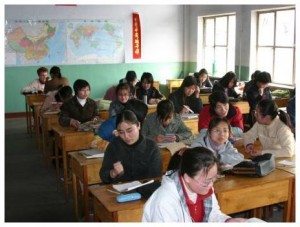In accordance with the timeframe in the research proposal, we and our research assistants began the interview work on March, 29. Since then, we have finished 3 interviews, in Beijing and Shanghai, with the leaders of our target education NGOs, and hold 3 free seminar-style discussions with scholars, journalists, publishers who are well informed about our issues.
The most impressive one is talking with Prof. Yang Dongping, the president of Twenty-first Century Institute of Educational Research in Beijing. As the most foremost advocate of education equity in China, Yang has been dedicating to building social justice and modern citizenship through the way of education innovation since the 1980s. Taking advantages of his reputation and wide media networks, he organized the first conference of Chinese education NGOs in 2009. He not only provided us the essential knowledge of his institutions, but also recommended us to many outstanding education NGOs we did not mention in our research proposal.
The other impressive one is meeting with Wang Yan, the female president of Teach Future China. Compared with Yang, She is not widely known, and dose not has much social capital. But she is determined and full of love to the poor. Being stimulated the huge education gap between the highly developed city and the undeveloped countryside, and deeply inspired by the movement of Teach for America, she gave up the comfort position in Chinese Teacher Daily to make herself concentrate on building good education for the poor children. Since 2009, she has successfully blazed an affecting way to implement her institutional vision which is to cultivate the leader of improving Chinese education equity. Now she and her graduate volunteers have severed nearly 2,000 rural students.
We decide to add Wang’s case to our research proposal which is previously composed of two cases, although this cost much money which will not be covered in the budget approved by the Foundation Open Society Institute.
Since we have obtained much knowledge from the interview works, we are sure that we can discover the ideological and institutional structures of different Chinese education NGOs and their difficult but hopeful developing orbits within the highly centralized Chinese political context, and the hot Chinese social economical situation.
The last interview is not so successful, since we do not find the right person like Yang and Wang who warmly welcome us to share their fights for education equity and social justice in China. We, however, have got much information about Cherished Dream Foundation from discussing with scholars and journalists.
Basically, now we can explain 3 big questions about Chinese justice oriented education NGOs. The first one is why they choose education as their essential way. Like the case of Yang, he has tried many ways to cultivate modern citizenship in China since the 1980s, including civilian environmental protection movement, producing progressive media programs in China’s Centre Television, but he transfer to the public field of education. His transformation contains the possibilities of progressive social movement under the change political climate. The second question is what they can do to implement their institutional ideal of education equity and social justice. In this aspect, different NGO has different actions or programs, depending on social capital and financial resource. The last question goes with their future vision and the difficulties in expanding their enterprises.
Zhou Yong yzhou@kcx.ecnu.edu.cn,
He Shanyun heshanyun@126.com
Tags: Activism, Development

